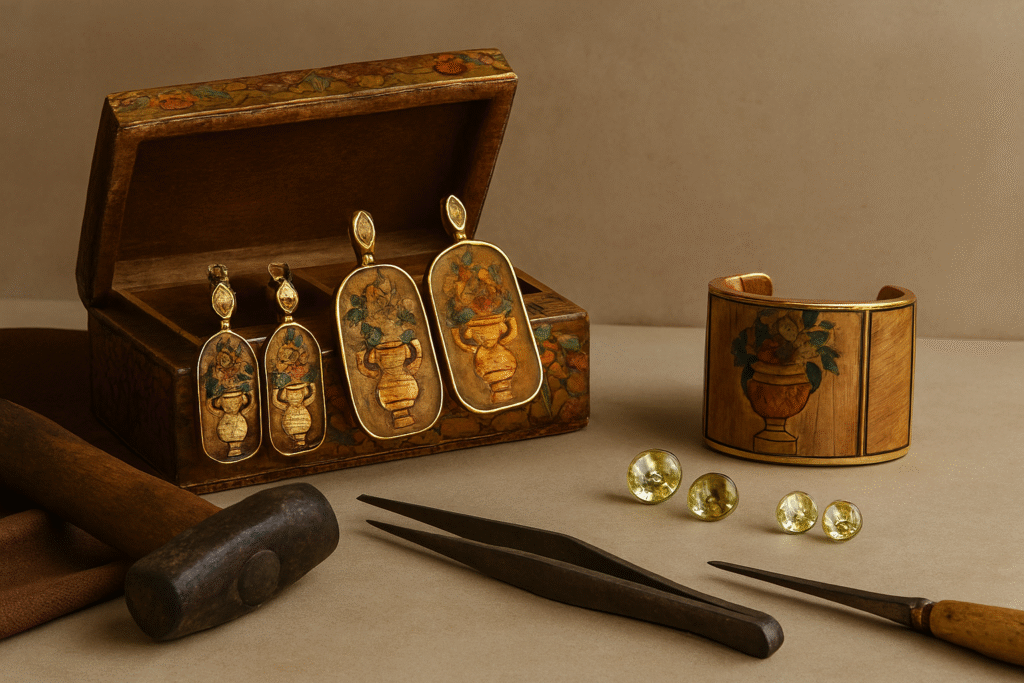Introduction
Journey of a Jeweler by Silvia Furmanovich explores how the Brazilian jeweler collaborates with artisans worldwide to create exceptional jewelry and luxury objects. Instead of focusing only on gemstones, she highlights the importance of traditions that continue to influence her work. Moreover, the book demonstrates how wood marquetry, bamboo weaving, and miniature painting blend seamlessly with gemstones to redefine fine jewelry.
Global Collaborations
Silvia Furmanovich embraces artisan traditions from multiple regions. For example, in India she partners with miniature painters who bring intricate detail to pendants and earrings. Meanwhile, in Japan she adapts bamboo weaving into jewelry, turning everyday techniques into fine design. In Brazil, she works directly with marquetry masters to merge delicate wood inlays with emeralds and diamonds. As a result, her projects show how global heritage finds renewed meaning in luxury design.
Jewelry Beyond Boundaries
The book offers far more than necklaces or rings. In fact, readers also discover handbags, furniture, and home décor crafted with traditional methods. Because these pieces combine creativity with heritage, they appeal to collectors and design enthusiasts alike. Furthermore, research shows that 70% of luxury buyers prefer handmade craftsmanship, which supports Furmanovich’s collaborative approach.
Case Study: Brazil’s Marquetry Legacy
In Brazil, Furmanovich introduces marquetry into high jewelry. She works hand-in-hand with artisans, ensuring their skills reach new audiences. Therefore, the collaboration results in pieces that earned her the Town & Country Jewelry Award. This recognition proves that preserving cultural heritage can also achieve commercial success.
FAQs
Q: What is Journey of a Jeweler about?
A: It’s a book by Silvia Furmanovich showcasing global artisan collaborations in fine jewelry and design.
Q: Why is Silvia Furmanovich important in the jewelry world?
A: She is recognized for blending unconventional materials with precious stones, making her a leader in cultural collaboration.
Q: Does the book only cover jewelry?
A: No, it also explores handbags, furniture, and luxury décor created with artisans worldwide.
For readers interested in jewelry standards, see: Understanding BIS Hallmark in Jewellery.
For advice on buying gold, read: 24K, 22K, 18K: What Every Gold Buyer Must Know.
For travel shoppers, explore: International Jewelry Buying Pitfalls.
Learn more on the official Silvia Furmanovich website.
Read about artisan preservation efforts at the World Crafts Council.
Small Luxury Hotels FAQ
Introduction
This small luxury hotels FAQ answers common questions about boutique stays. It explains definitions, differences with large chains, and which services to expect. In addition, it covers family options, sustainability, and tips on finding the right property.
What defines a small luxury hotel?
- Fewer than 100 rooms.
- Personalized attention and privacy.
- Strong links to local design.
- Locations in unique urban or rural areas.
As a result, travelers often choose them for a more intimate experience. Moreover, their distinctive style sets them apart from standardized hotels.
Why choose a small luxury hotel?
Personal service
Staff remember guest details, therefore creating a sense of familiarity.
Calm spaces
Unlike large hotels, these properties feel quieter, so you can relax more easily.
Local culture
For example, menus highlight regional produce, and interiors reflect local crafts.
In addition, many guests return because the experience feels authentic.
How do small luxury hotels differ from large chains?
Guest experience
Small hotels provide tailored attention, while chains rely on uniform systems.
Property identity
Each boutique hotel has its own theme. On the other hand, large chains repeat formats worldwide.
Dining approach
Menus change seasonally and locally. Therefore, guests enjoy fresh variety instead of standard global menus.
Are small luxury hotels only for leisure stays?
Business features
- Lounges double as meeting rooms.
- Private dining options support work dinners.
Digital needs
- Fast Wi-Fi supports remote work.
- Quiet spaces help concentration.
Because of these advantages, small luxury hotels appeal to both business and leisure travelers.
What services can you expect?
- Concierge services for tours and dining.
- Fine dining menus with seasonal ingredients.
- Spa and wellness treatments.
- Added extras like minibars and welcome gifts.
Moreover, services shift depending on location. For example, a city hotel might offer cultural tours, while a rural retreat offers farm experiences.
Are small luxury hotels family-friendly?
Options for families
- Connecting rooms for parents and children.
- Child-friendly amenities such as menus or games.
Adults-only stays
- Some properties focus on privacy.
- Guests find peaceful, child-free environments.
Therefore, always check booking policies, because each hotel sets its own approach.
Do these hotels support sustainability?
Sourcing and dining
Farm-to-table meals reduce transport impact. In addition, guests enjoy fresher produce.
Environmental focus
Plastic use is restricted, while refillable bottles are encouraged. Smart energy systems reduce wastage.
Local involvement
Hotels support the community by hiring regionally. As a result, growth extends beyond the property.
How do you find the right small luxury hotel?
Define needs
Decide if food, spa, culture, or privacy is your top priority.
Check guest feedback
For example, repeat reviews about service often signal consistency.
Compare value
Packages may include meals, transfers, or early check-in. Therefore, higher prices can still deliver stronger value.
Are small luxury hotels worth the price?
Value of service
Guests pay for attention, comfort, and privacy. Moreover, experiences feel tailored and unique.
Extras add value
Some hotels include exclusive experiences or benefits. Finally, weigh these extras against nightly rates.
As a result, many travelers feel these hotels justify their price when quality matters most.

